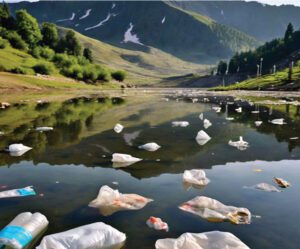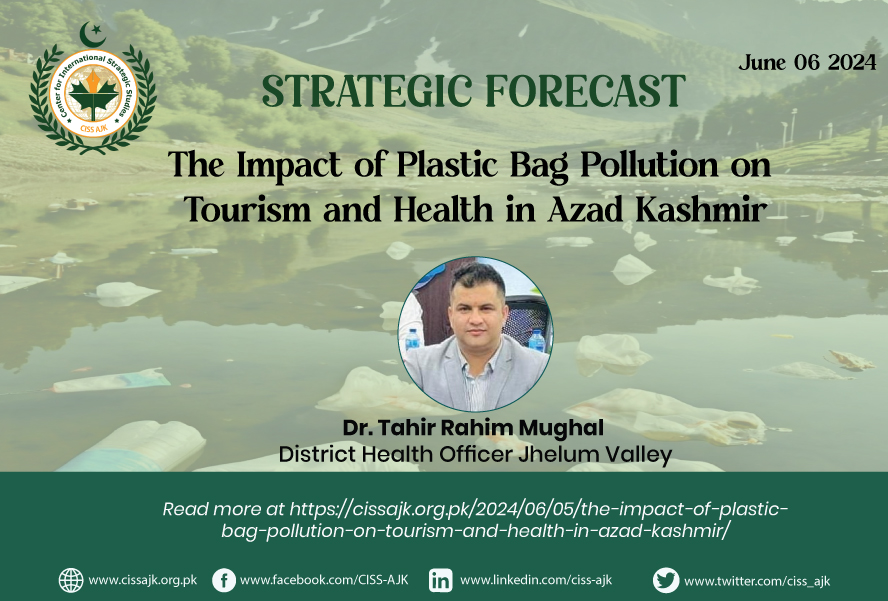
Plastic bag pollution has emerged as a critical environmental issue with far-reaching implications, particularly for regions like Azad Kashmir. This state, renowned for its breathtaking landscapes and cultural heritage, is grappling with the pervasive problem of plastic waste, which threatens both its burgeoning tourism industry and the health of its ecosystems and inhabitants.
The Rise of Plastic Bag Pollution
The widespread use of plastic bags in daily life has led to an environmental crisis. These bags, often used once and discarded, accumulate in the environment due to their non-biodegradable nature. In Azad Kashmir, the improper disposal and inadequate waste management infrastructure exacerbate the problem. Plastic bags clog waterways, contaminate spring water, litter landscapes, and contribute significantly to pollution, posing a severe threat to the region’s natural beauty and biodiversity.
A study by the World Health Organization (WHO) found that over 90% of bottled water samples contained microplastics, which are often derived from plastic packaging materials and can pose potential health risks to humans .Research published in Research Gate & Environmental Science & Technology estimated that humans consume between 39,000 to 52,000 microplastic particles annually through food, beverages, and air, with significant contributions from plastic packaging and plastic bags. According to the United Nations Environment Programme (UNEP), about 5 trillion plastic bags are used worldwide every year, and only about 1% are recycled properly. The majority end up in landfills or the environment, leading to widespread pollution and health risks .The Environmental Pollution journal reported that burning plastic waste, including plastic bags, contributes to about 12% of the global dioxin emissions, which are highly toxic and can cause severe health problems including cancer and developmental disorders.
Impact on Tourism
Tourism, a vital and growing component of Azad Kashmir’s economy, provides essential support to the local community. The region’s picturesque valleys, pristine rivers, pure spring waters, and lush greenery attract visitors from far and wide. However, the increasing presence of plastic bag litter is tarnishing this idyllic image. Scenic spots, once pristine, are now marred by plastic debris, deterring tourists who seek unspoiled natural environments.
The visual pollution caused by plastic bags is more than just an eyesore; it significantly detracts from the overall visitor experience. Tourists, both domestic and international, expect high environmental standards when visiting natural attractions. The sight of plastic waste diminishes the appeal of these destinations, leading to a decline in tourist arrivals. This decline directly impacts the economy, affecting local businesses and livelihoods that depend on tourism.
Ecological Consequences
The ecological consequences of plastic bag pollution are profound. In Azad Kashmir, plastic waste poses a significant threat to wildlife. Animals, both terrestrial and aquatic, often mistake plastic bags for food, leading to ingestion. This can cause blockages in their digestive systems, leading to malnutrition, internal injuries, and often death.
Aquatic ecosystems are particularly vulnerable. Plastic bags in rivers and streams disrupt the natural flow of water, affecting fish and other aquatic organisms. These bags can also entangle wildlife, leading to injury or death. Moreover, as plastic degrades, it breaks down into micro plastics, which are ingested by smaller organisms, entering the food chain and potentially impacting human health as well.
Human Health Risks
The health implications of plastic bag pollution extend to human populations. In Azad Kashmir, the improper disposal of plastic waste can lead to clogged drainage systems, creating breeding grounds for mosquitoes and other disease vectors. This increases the risk of diseases such as malaria and dengue fever.
Burning plastic waste is another common practice in areas lacking proper waste management facilities. This releases toxic chemicals, including dioxins and furans, into the air, posing serious health risks to nearby communities
Plastic bags contribute to the accumulation of microplastics in the environment, which can enter the human food chain and potentially cause health issues such as inflammation and cancer1.
- Chemicals used in the production of plastic bags, such as phthalates and bisphenol A (BPA), have been linked to hormonal disruptions and reproductive problems in humans.
- Improper disposal of plastic bags can lead to the blockage of drainage systems, creating breeding grounds for disease-carrying mosquitoes and increasing the risk of diseases like malaria and dengue fever.
- Incineration of plastic bags releases toxic fumes, including dioxins and furans, which are harmful to human respiratory health and can increase the risk of chronic illnesses like asthma and bronchitis.
Socioeconomic Impact
The socioeconomic impact of plastic bag pollution in Azad Kashmir is multifaceted. The decline in tourism revenue affects not only businesses directly involved in the sector but also those in ancillary industries such as transportation, food services, and local crafts. This economic downturn can lead to increased poverty and reduced quality of life for many residents.
Additionally, the cost of managing plastic waste strains local government resources. Funds that could be used for development projects, healthcare, and education are instead diverted to waste management and cleanup efforts. This hampers the overall development of the region and affects the well-being of its inhabitants.
Solutions and Mitigation Strategies
Addressing the issue of plastic bag pollution requires a comprehensive and multi-faceted approach. Here are some strategies that can be implemented in Azad Kashmir:
1 Legislation and Enforcement: Implementing and enforcing bans on plastic bags, coupled with strict penalties for violations, is essential to significantly reduce their prevalence.
2 Promoting Alternatives: Encouraging the use of eco-friendly alternatives such as cloth bags, jute bags, and biodegradable bags can help reduce reliance on plastic. Public awareness campaigns can educate residents and tourists about the benefits of these alternatives.
- Improving Waste Management: Investing in better waste management infrastructure is crucial. This includes setting up proper collection, segregation, and recycling facilities. Community involvement in waste management can also enhance effectiveness.
- Tourism Industry Initiatives: The tourism industry can play a significant role by adopting sustainable practices. Hotels, resorts, and tour operators can minimize plastic use, promote recycling, and engage tourists in environmental conservation efforts.
- Community Engagement: Local communities should be actively involved in combating plastic pollution. Educational programs in schools and communities can raise awareness about the harmful effects of plastic and the importance of proper disposal.
- Partnerships and Collaborations: Collaboration between government agencies, NGOs, and the private sector can amplify efforts to tackle plastic pollution. Joint initiatives can leverage resources, expertise, and networks for greater impact.
Bio of writer :-
Dr. Tahir Rahim Mughal is a renowned medical professional whose expertise spans several prestigious institutions. He earned his MBBS from Dalian Medical University in China, an MS in Public Health from Quaid-e-Azam University in Islamabad, and an MCPS from Pakistan. With a career dedicated to improving public health, Dr. Mughal currently serves as the District Health Officer in the breathtaking Jhelum Valley of Azad Kashmir. His leadership and dedication have been pivotal in advancing healthcare initiatives and ensuring the well-being of the local community. Dr. Mughal’s work continues to make a profound impact on public health, reflecting his commitment to excellence and service.

